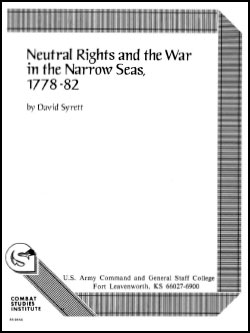
By David Syrett
44 Pages
Published: 1985
This paper on neutral rights on the high seas and the origins of the Fourth Anglo-Dutch War grew out of a much larger and continuing study of the Royal Navy during the American Revolutionary War.
The rights and duties of both neutrals and belligerents on the high seas during war is a complex subject. National policy, strategy, naval tactics, diplomacy, economics, international and metropolitan law, the laws and customs both of the sea and of war, and the threat or the use of brute force by nation-states to attain their goals--all become intertwined and are as difficult to unravel as a splice in a length of wire rope.
Against a background of gunfire and continual diplomatic crises, politicians, diplomats, navy officers, admiralty court judges, lawyers, merchant shipowners, the owners of cargoes, and insurance companies all manipulate and maneuver in an attempt to gain their own ends. Rarely do any of these interests coincide. What may be sound admiralty law might be bad diplomacy. A seemingly legal and profitable trading venture might result in the loss of a ship or the beginning of a war. Or what the military and naval leaders of a state think is an absolutely necessary military measure may be seen by politicians and diplomats as a sure way of bringing about national ruin.
Download the PDF 